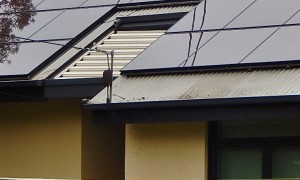Reduced utility bills. A greener lifestyle. Tax incentives. These are just a few reasons why some homeowners are opting to switch to solar power. But, what is it right for your home? We asked Sunrun, the largest dedicated residential solar company in the U.S. to answer 5 frequently asked questions about solar power to help you weigh the pros and cons.
1. Why solar power? What benefits does a homeowner see from switching to solar power?
The biggest benefit homeowners receive from going solar is saving money on their electric bills. Sunrun customers save 20%* on their bills and are able to lock in those rates for 20 years. In addition to saving money, homeowners who go solar are benefiting the environment and their local community by reducing the need for their utility provider to produce energy with fossil fuels. It is far more efficient for a utility to get clean solar electricity produced off the roof of someone’s home than it is to bring in power from electricity generation plants miles away.
2. How much does installing solar panels on a standard home cost? And will solar power pay for itself?
Sunrun’s most popular product is BrightSave®, a solar lease that allows a homeowner to get solar installed for little to zero down. Whether you go with a monthly or prepaid solar lease you can start saving immediately, without the hassle of ownership. There is no waiting for the system to pay for itself, you start saving the moment the system is turned on.
3. How does the weather affect solar power? For instance, what happens if it’s a cloudy or snowy day? Do solar panels still generate energy?
You’re hitting on one of the key areas a homeowner should pay attention to when determining whether going solar is right for their home. Sunrun guarantees energy production** for our customers rain or shine. If after 12 months your solar system falls short of your production guarantee Sunrun will cut you a check for the difference.
4. What incentives are available to homeowners to switch to solar?
On a Federal level homeowners who own their solar PV system qualify for an Investment Tax Credit of 30%, while many state and local governments also offer incentives to go solar. Sunrun does all the work for homeowners, handling all the paperwork involved in obtaining the incentives you would qualify for and maximizes them to their full advantage when determining the final system cost.
5. Will solar panels increase the value of my home?
It depends on a few factors, such as whether you own the solar array on your roof or not. For homeowner-owned systems, the U.S. Department of Energy’s Lawrence Berkley Lab recently found that home buyers are typically willing to pay a $15,000 premium for homes with an installed solar array.
Regardless, residential solar is a fast-growing trend and more and more home buyers are looking for homes where they know their energy bills will be low. So any home solar solution will help make your home more attractive to potential buyers. Sunrun also guarantees our systems will transfer to the home’s new owner. We have a dedicated team of transfer specialists who make transferring a home between seller and buyer hassle-free.
Have a question about solar power that isn’t answered here? Tweet @sunrun and use the hashtag #SolarRealEstate.
- *Estimated savings based on a projected annual utility rate increase of 3.16% over the life of the system. Actual savings will vary. Savings depends on several factors, including product type, system production, geography, weather, shade, electricity usage, full utilization of the 30% solar Investment Tax Credit by the system owner, and utility rate structures and rate increases. Analysis based on customers who enrolled with Sunrun between October 15, 2014 and October 15, 2015. See www.sunrun.com/save20 for details.
- **Sunrun guarantees 100% of the guaranteed output during the initial term of the agreement for BrightSave Prepaid and 95% for BrightSave Monthly Lease. Please see https://www.sunrun.com/why-sunrun/your-guarantee for details.







Very well said, I saw that there is an improvement on Solar Panel. Whether rain or shine, the Solar PV is still efficient on produce it’s own electricity.